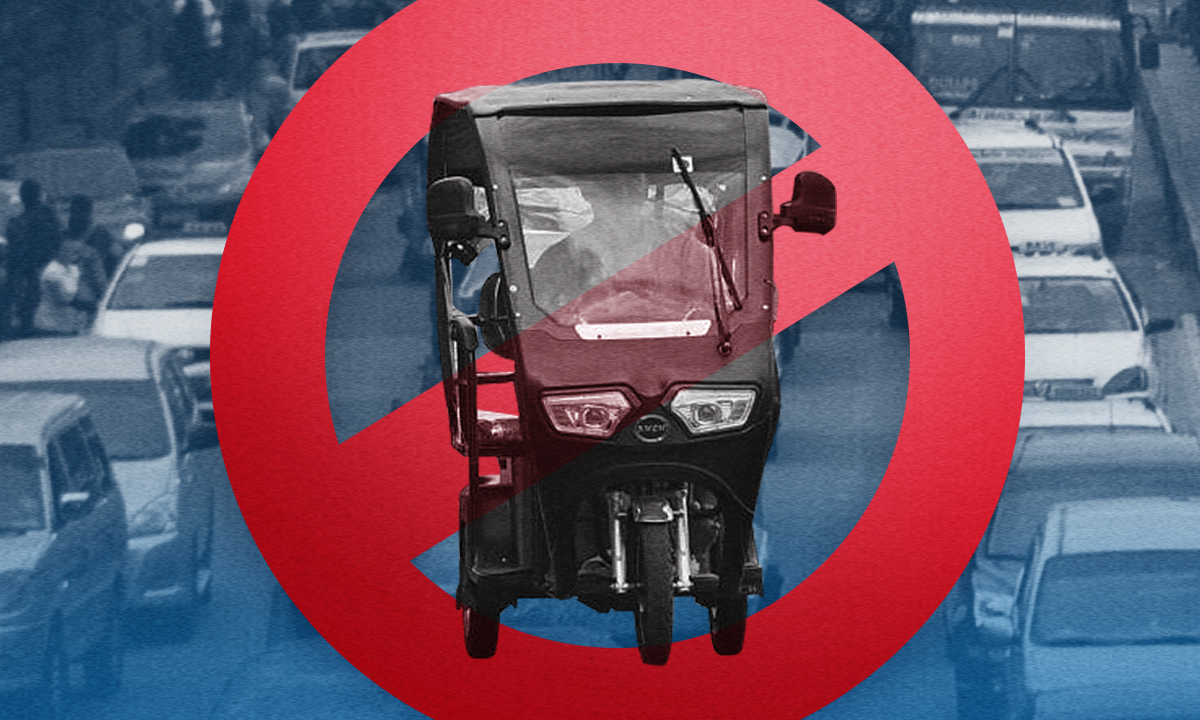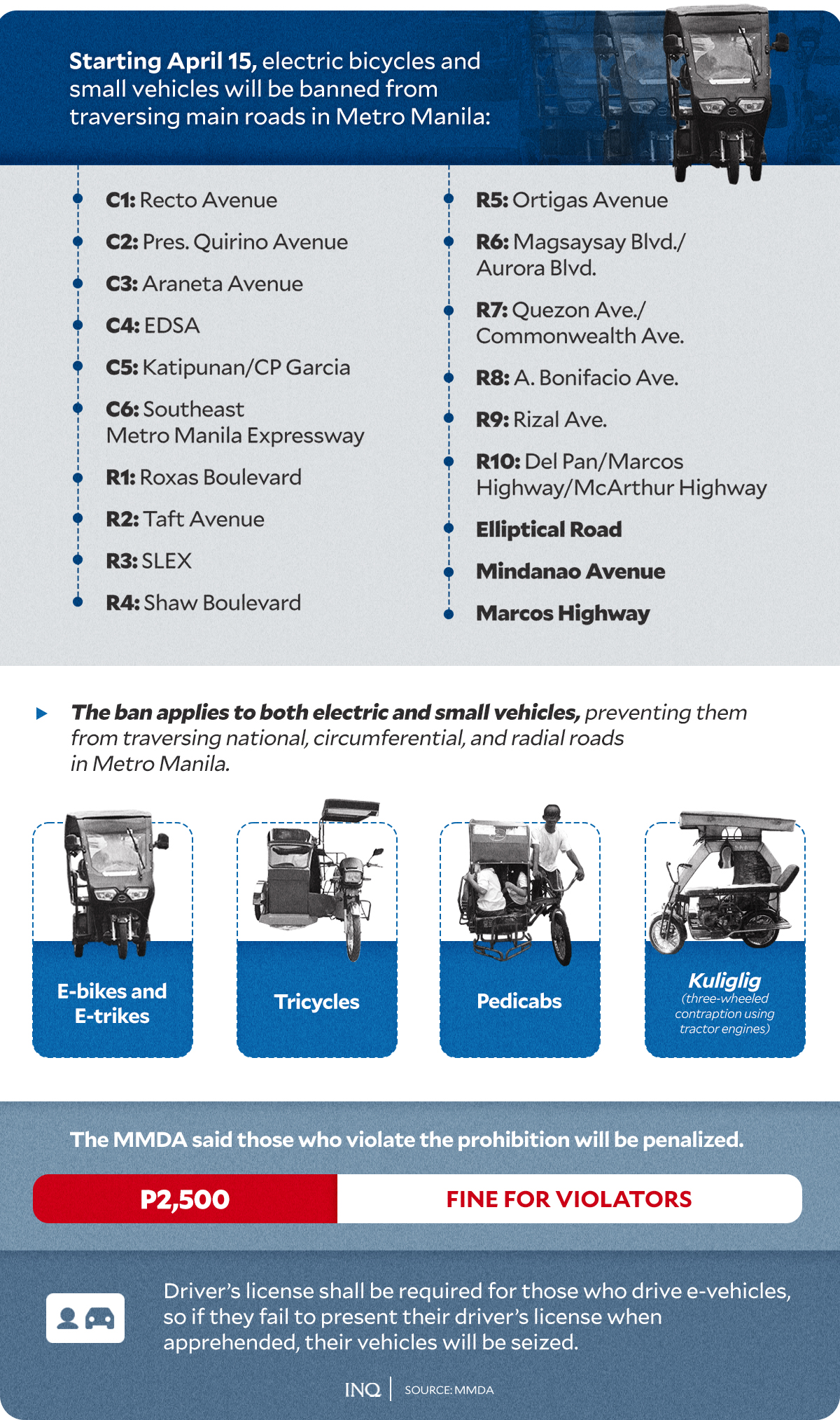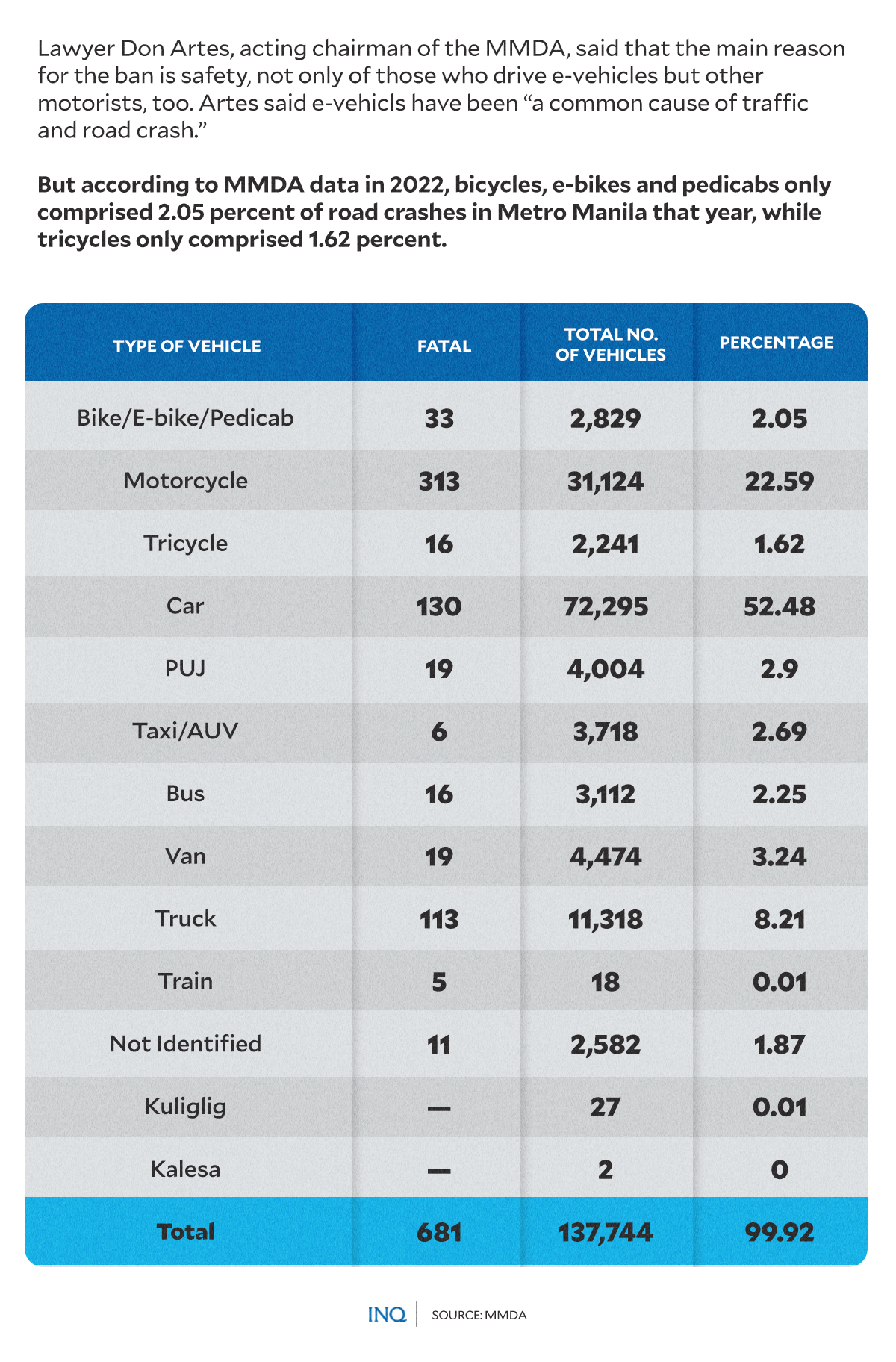MMDA ban: Making sense of how bikes with batteries cease to be bicycles
MANILA, Philippines—With Metro Manila’s extremely chaotic roads and public transport system, people in need of mobility have turned to battery-operated bicycles, trikes and scooters to get them from point A to point B.
But the Metropolitan Manila Development Authority (MMDA) deemed them unsafe on what the agency defined as national roads and issued an order banning these on selected thoroughfare starting on April 15.
READ: E-bike ban on major Metro Manila roads to take effect April 15
Following MMDA’s logic, bicycles with rechargeable batteries strapped on them cease to become bicycles. Trikes and scooters powered by the same are also unwelcome additions to Metro Manila roads that are already bursting at the seams because of the sheer volume of cars, buses, trucks, jeepneys, vans and other gasoline or diesel-fed vehicles.
But the group Make It Safer Movement, which advocates common sense solutions to road chaos, said banning e-bicycles, trikes and scooters from national roads was really “a step in the wrong direction.”
READ: MMC passes resolution banning e-bikes on major roads
The numbers will show why.
According to government data, from 2010 to 2019, 11,950 EVs had been registered with e-trikes making up 56.76 percent and e-bikes making up 35.65 percent of the total.
According to the government think tank Philippine Institute for Development Studies (PIDS) and the Department of Trade and Industry, EVs will make up 21 percent of all vehicles by 2030.
Make It Safer Movement said e-bicycles, trikes or scooters don’t discriminate. Their users are mothers, seniors, health care workers, persons with disabilities, everyday workers, single parents who pick up their children from school, and regular office workers who want alternatives to a public transport system that is horrific at best.
The group called on local officials: “We, your constituents, appeal to your better intentions to ensure that our cities’ over P5 billion contributions are not funding more of MMDA’s (Metropolitan Manila Development Authority) #BanAidSolutions.”
RELATED STORY: MMC to release guidelines before start of e-bikes, e-trikes ban
Concerned road users and inclusive mobility advocates pointed out that “if we do this right, strong evidence shows that properly integrating e-bikes and e-trikes in our transport system paves the way for more inclusive mobility and a significant reduction in carbon emissions.”
As announced by the MMDA, starting April 15, EVs and light vehicles will already be banned from national, circumferential, and radial roads in Metro Manila. Acting MMDA chief Don Artes said violators face a fine of P2,500.
‘They deserve space’
Artes said the ban is not new. He said it has been in place since 2020.
The ban, he said, was MMDA’s way of ensuring that users of e-bicycles, e-trikes, and even tricycles will be safe and compliant on the road, especially since they travel at a permissible maximum speed of 25 kilometers per hour (kph).
But as concerned road users and inclusive mobility advocates said, e-bicycles and e-trikes are part of the solution, not the problem: “We deserve space on the road. In the absence of accessible public transportation, these modes fill the gaps more efficiently and sustainably than private motor vehicles.”
“Each individual or family that uses an e-bike or e-trike is one less car on the road. Discouraging their use will only compel more people to use cars, which will not resolve the issue of road safety or traffic congestion,” they said on Monday (March 11).
They said contrary to what Artes said that EVs had been a common cause of accidents on the road, data from the MMDA itself were clear—52.48 percent of road crashes in 2022 involved cars, while only 3.67 percent involved two- and three-wheeled vehicles.
“We do not deserve your hostility,” Make It Safer Movement said.
“E-bikes and e-trikes help graveyard-shift workers — from hospitals, call centers, and construction sites — travel home safely when there is no public transportation to ride late at night,” the group said.
“It helps a rider fulfill multiple jobs to deliver goods from house to house. It helps a single mother bring her kids to school and carry food and groceries,” it added.
‘Cover-up’
Critics of the ban pointed out what they said was the MMDA diverting the issue away from its failure to implement infrastructure designed to keep pedestrians, cyclists and commuters safe.
Also millions of pesos had been spent on traffic management programs that did not deliver results.
The critics said the government was supposed to provide protected lanes on key roads to make it safe for users of e-bikes and e-trikes to traverse national roads in Metro Manila, a burgeoning capital with 16 cities and one municipality.
“Banning e-bikes and e-trikes is a #BanAidSolution to road safety, a cover-up for the government’s failure to provide effective protected infrastructure,” said Make It Safer Movement.
“The government should not penalize citizens and taxpayers for its failure to build infrastructure that would protect vulnerable road users,” the group said.
Back in 2022, the government’s Active Transport and Safe Pathways Program received P2 billion. It got P705 million in 2023 and P1 billion in 2024. The money was to complete a 2,400-kilometer bike lane network by 2028. As of June 2023, not even half of the target has been achieved—only 564 km built.
READ: P1 billion in 2024 budget for more bike lanes, facilities
The shortcoming falls all over the brazen violation of bike lane rules in Metro Manila. Such lanes often end up as parking spaces, forcing e-bike and e-trike users to spill over to regular lanes and risk being stricken by other vehicles even if the speed limit in Metro Manila was fixed at 50 to 60 kph.
As Make It Safer Movement said: “It is clearly stated in this General Appropriations Acts of 2023 and 2024 special provision: ‘Promotion of People Mobility.”
“The MMDA shall promote people mobility through road sharing projects and activities (emphasis supplied) as well as the use of non-motorized modes of transportation’.”
RELATED STORY: MMDA’s knee-jerk ban on e-bikes


